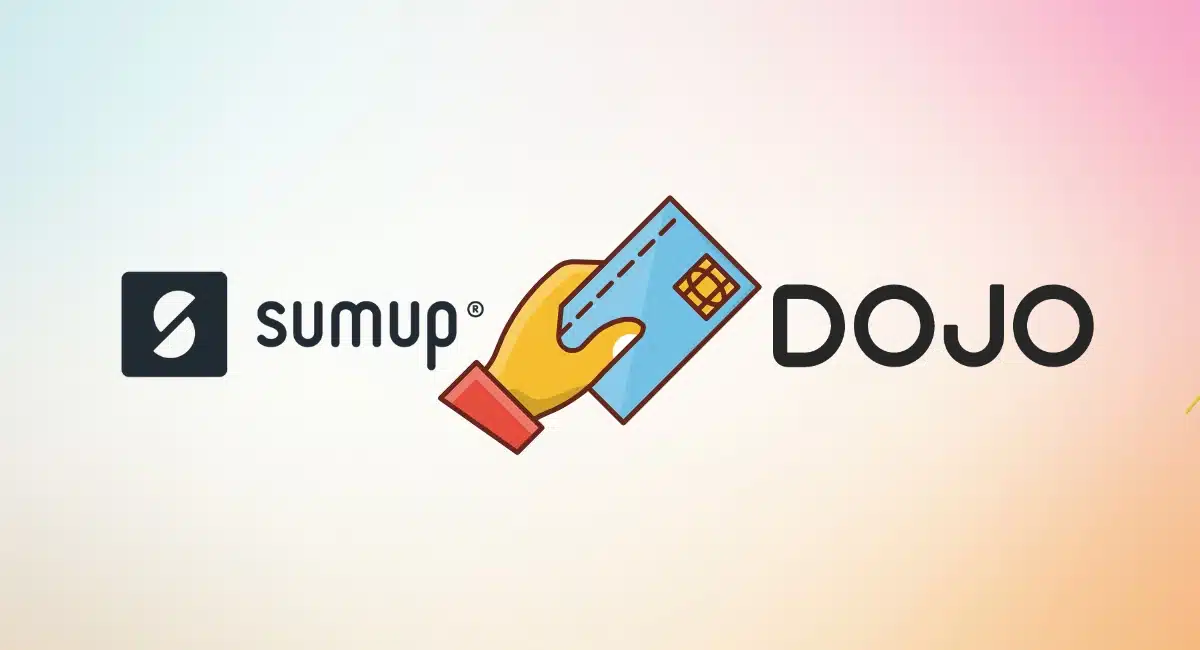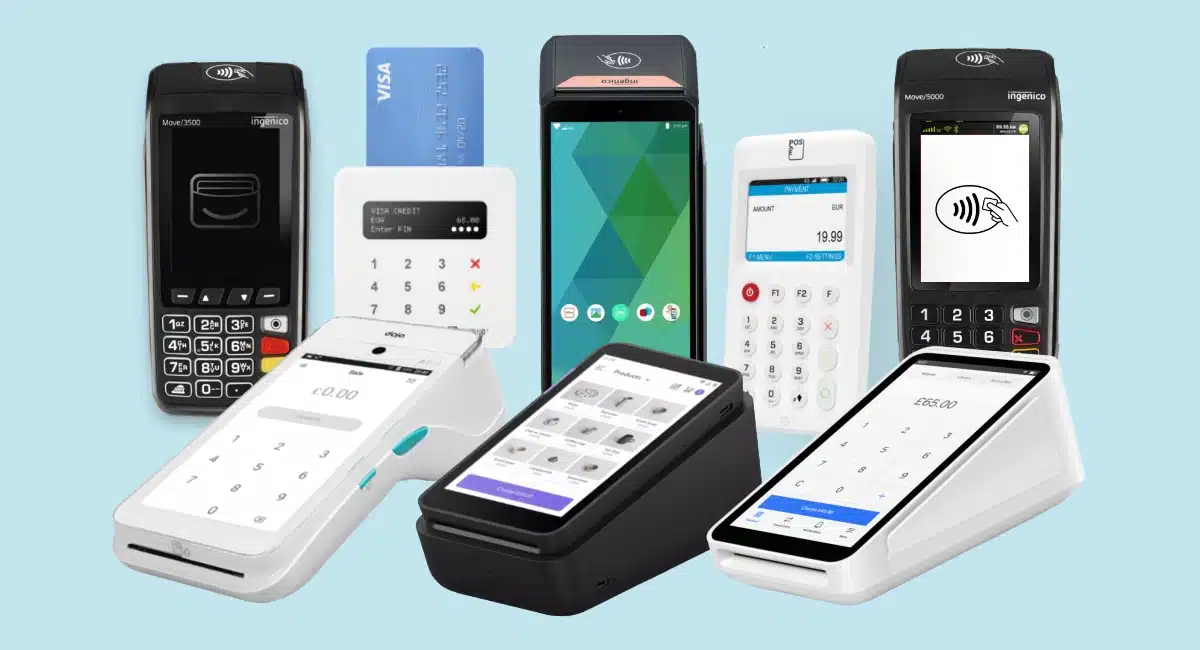The choice of card machines for small businesses is wider than ever, as contactless and chip card payments have proven indispensable. Two of the most popular options in the UK are SumUp and Dojo.
Launched by Paymentsense, Dojo offers a single package with a high-quality card terminal, payment processing and useful extras. SumUp, in contrast, offers several cheaper card machines, more business tools and multichannel sales features.
Both are great solutions, but let us compare the card machines, costs, software and service for a better idea of which is better for your business.
 |
 |
|
|---|---|---|
| Best for | Small-to-medium business with £10-12.5k+/mo card turnover | Small businesses with less than £5-10k/mo card turnover |
| Contract | 12 months | No lock-in |
| Card machines | Rented – with monthly fee | Purchased – no monthly fee |
| Fees | Fixed or custom card rates Min. monthly fee required |
Fixed card rate No min. monthly fee |
| Remote payments | Payment links, QR codes, virtual terminal | Payment links, QR codes, virtual terminal, online store, invoicing |
| Payouts | Next day in bank account | Next day in SumUp account 1-3 weekdays in bank account |
| Cards accepted | Visa, Mastercard, Discover, Diners Club; Amex with extra contract | Visa, Mastercard, Amex, Discover, Diners Club, UnionPay, JCB |
| POS software | Integrates with over 500 POS systems | Free or paid SumUp POS app; integrations available |
| Reporting | Included; QuickBooks integration | Included; no integrations |
| Customer support | 7 days a week | 7 days a week |
 |
 |
|---|---|
| Best for | |
| Small-to-medium business with £10-12.5k+/mo card turnover | Small businesses with less than £5-10k/mo card turnover |
| Contract | |
| 12 months | No lock-in |
| Card machines | |
| Rented – with monthly fee | Purchased – no monthly fee |
| Fees | |
| Fixed or custom card rates Min. monthly fee required |
Fixed card rate No min. monthly fee |
| Remote payments | |
| Payment links, QR codes, virtual terminal | Payment links, QR codes, virtual terminal, online store, invoicing |
| Payouts | |
| Next day in bank account | Next day in SumUp account 1-3 weekdays in bank account |
| Cards accepted | |
| Visa, Mastercard, Discover, Diners Club; Amex with extra contract | Visa, Mastercard, Amex, Discover, Diners Club, UnionPay, JCB |
| POS software | |
| Integrates with over 500 POS systems | Free or paid SumUp POS app; integrations available |
| Reporting | |
| Included; QuickBooks integration | Included; no integrations |
| Customer support | |
| 7 days a week | 7 days a week |
Card machines
Dojo’s and SumUp’s main offering is their card machine range.
In Dojo’s case, there is only one model: a PAX A920 smart POS terminal with a touchscreen. SumUp sells three packages: SumUp Air that works with an app, handheld SumUp Solo with a touchscreen and SumUp Solo and Printer that comes with a receipt printer.
Let’s begin with SumUp Air, the longest-standing and cheapest model of them all. Via Bluetooth, it connects with an app that acts as a POS system on your iPhone, iPad or Android device – the card reader does not work on its own. It’s ideal for mobile use, but can be purchased with a holder for a till point.
It has a long battery life (500 transactions from full charge) since it only powers up when the merchant selects ‘card’ as the payment method for a transaction. The card reader can then accept a contactless payment or chip card with a PIN code entered on its glass-covered PIN pad.
Photo: Emily Sorensen (ES), MobileTransaction
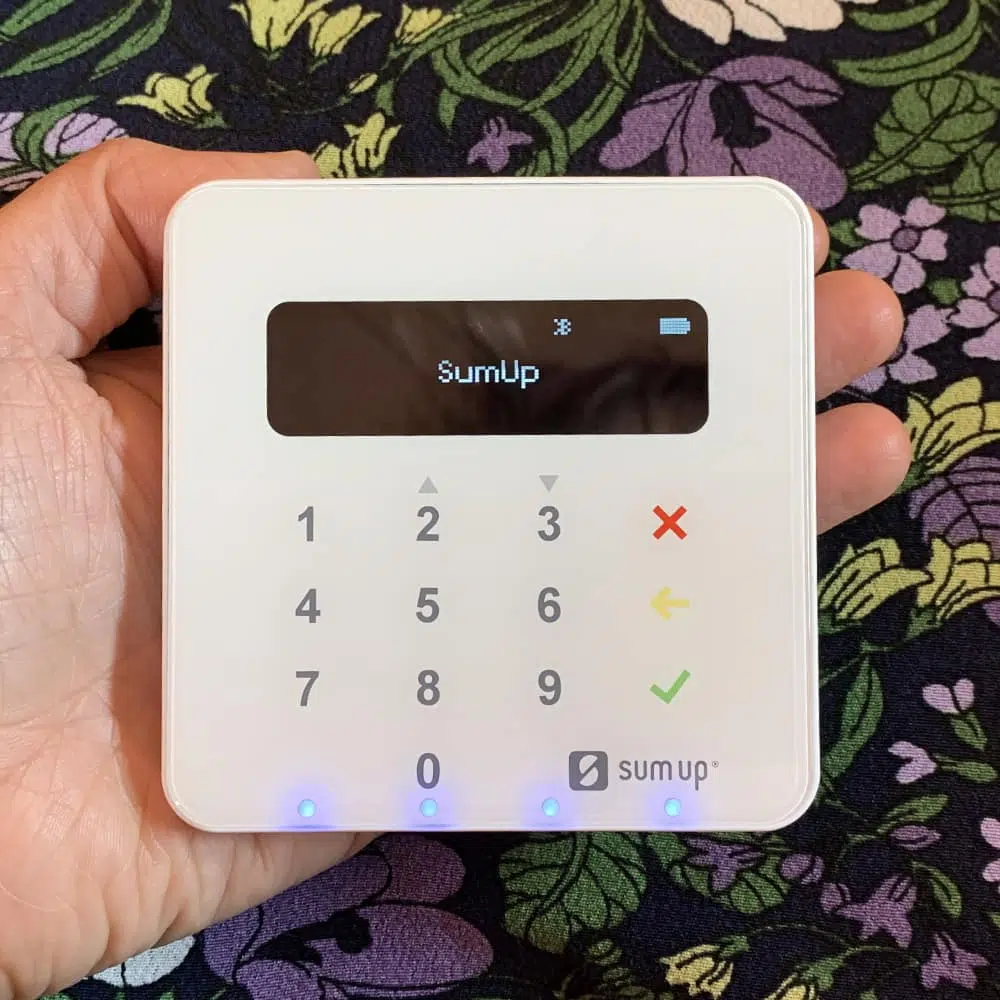
SumUp Air.
Photo: ES, MobileTransaction
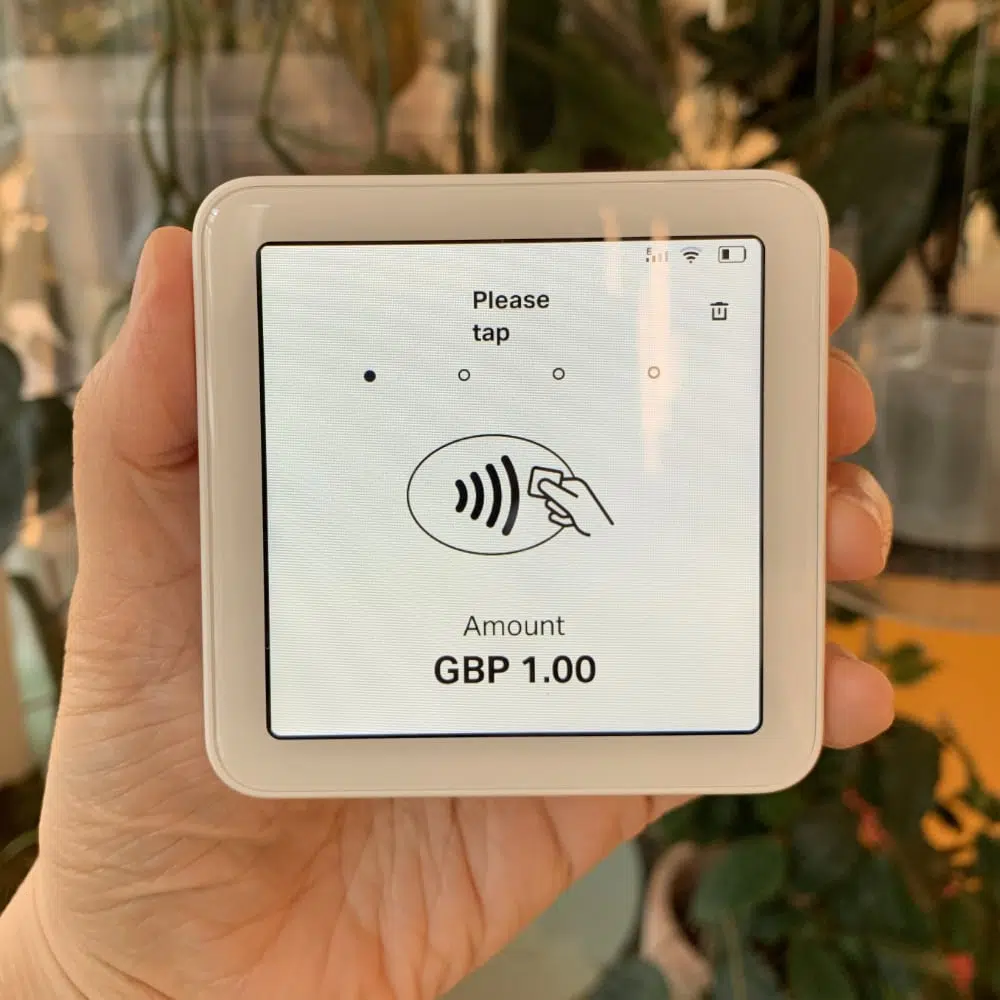
SumUp Solo.
Then there’s SumUp Solo, a similarly small and square-shaped terminal that doesn’t need an app to function. Instead of buttons, it has a touchscreen with simple software that allows you to add an amount and accept chip and contactless payments. A virtual PIN pad is displayed on the screen when required.
“SumUp Solo is one of the most unique card readers I’ve tested – but also the most frustrating at times. It forced some updates at inconvenient times and the battery didn’t last that long, but the latest version has apparently improved.”
– Emily Sorensen, Senior Editor, MobileTransaction
SumUp Solo and Printer is a two-part, portable set with a SumUp Solo terminal and accompanying Solo Printer stand that prints receipts and acts as a power bank for the card reader.
Photo: Emmanuel Charpentier, MobileTransaction
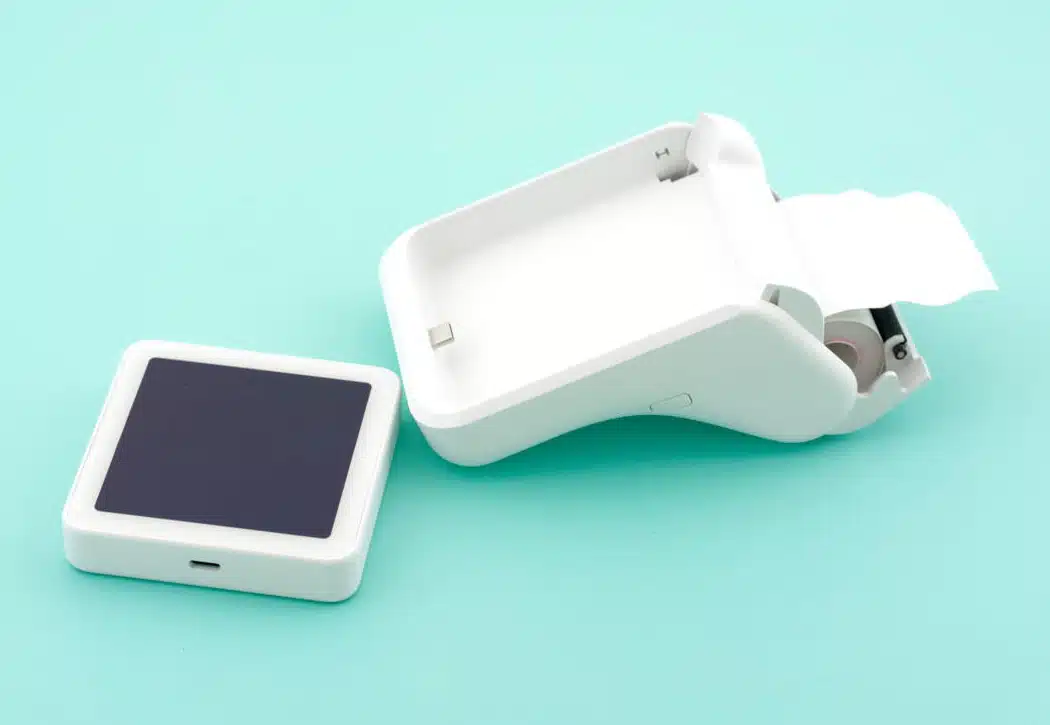
SumUp Solo next to its receipt printer attachment.
The Solo terminal can accept tips, process refunds, send email or text receipts and change the display language. It is not for any other functions, just card or mobile wallet payments without an inventory library, cash acceptance or other till functions.
Because it works independently, Solo’s battery life was shorter at about 100 transactions from a full charge when we tested it. It has since improved so it lasts longer, especially if you get the printer package and make use of its power bank capabilities.
You don’t have to worry about connectivity, since Solo includes a SIM card with unlimited data for 3G/4G if not using WiFi.
Dojo’s standalone card machine – included in the Dojo Go package – is the size of a traditional card machine and comes with a countertop base. It is the most sophisticated of the bunch, accepting swipe, chip and contactless payments and has a receipt printer, 5″ HD touchscreen, Android operating system and 10-hour battery life.
Photo: ES, MobileTransaction
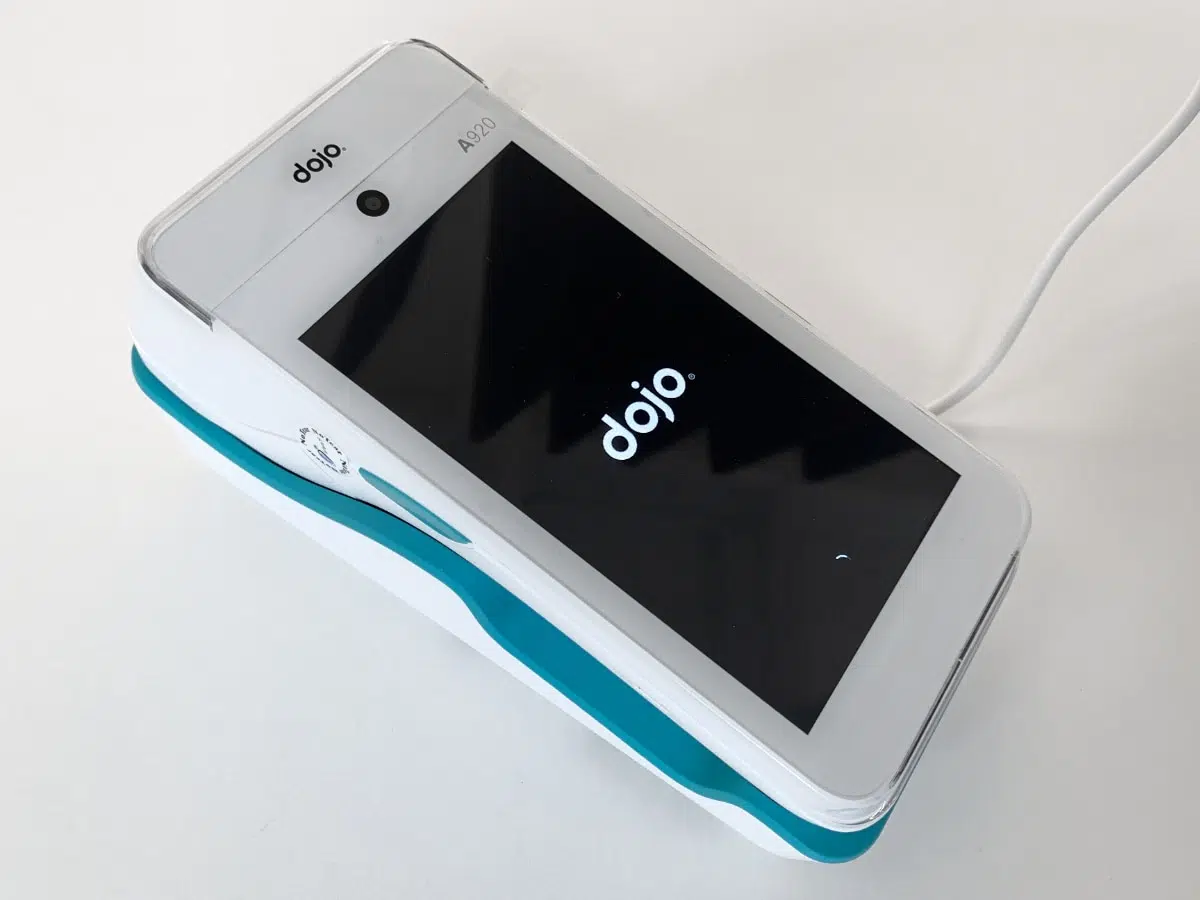
Dojo Go terminal in its countertop holder.
That said, Dojo’s payment software installed on the terminal is very basic. It only lets you enter an amount and description to create a transaction, and receipts can be sent digitally or printed by the terminal. Sales can be monitored remotely from your smartphone in the Dojo app.
Dojo Go also integrates with over 500 point of sale (POS) systems, making it suitable for stationary till points. Otherwise, it works through WiFi or 4G with its inbuilt SIM card, ideal on the go or portably for table service around your premises.
There’s a smaller card machine, Dojo Pocket, for table-side payments, but this is only available as an add-on for merchants with Dojo Go.
Costs: rental vs pay-as-you-go
Pricing and type of contract are things you should consider carefully – they are very different between the providers.
SumUp’s card machines are purchased upfront so you own them without a contract. You get a 30-day money back guarantee, year’s product warranty and free shipping with that. The card readers cost between £39–£139 + VAT (offers here) depending on the model.
Then there’s only a pay-as-you-go rate of 1.69% per card machine transaction. For a monthly fee of £19 (SumUp One subscription), the rate is only 0.99% for all card transactions including online ones. If your annual turnover is above £60,000, you can negotiate even lower, custom rates.
“If your business transacts for over £2,800 monthly, you save money with SumUp One compared with the pay-as-you-go rate. And monthly sales above £5,000 grant you the chance of even lower fees with SumUp’s custom rates. So Dojo is no longer the better choice for busy shops, necessarily.”
– Emily Sorensen, Senior Editor, MobileTransaction
Dojo requires a rental contract of 12 months, after which it switches to monthly rolling.
With an annual card turnover below £150,000 (£12.5k monthly), the monthly rental costs £20 + VAT, but then you avoid a high upfront price, and Dojo can pay up to £500 of exit fees for your previous card machine contract if you’re stuck in one.
With a card turnover exceeding £150,000 per year, the rental plan has a custom monthly fee. In addition, Dojo can pay up to £3000 of exit fees for your previous contract.
| Dojo costs | SumUp costs | |
|---|---|---|
| Contract | 12 months | None |
| Price (purchase) |
n/a | SumUp Air: £39 + VAT SumUp Solo: £79 + VAT SumUp Solo & Printer: £139 + VAT |
| Monthly fee (rental) |
Card turnover <£150k/yr: £20 + VAT Card turnover £150k+/yr: Custom £24.95 monthly min. charge |
n/a |
| Transaction fees | 1.4-1.99% + 5p Higher fees for Amex |
Pay-as-you-go: 1.69% for any card SumUp One (£19/mo): 0.99% for any card |
| Refunds | 50p each | Free or transaction fee retained |
| Chargebacks | £28 + VAT each | £10 each |
Dojo’s transaction fees are personalised if you receive more than £150k annually in card transactions (get a quote here). Below this limit, fees are:
- 1.4% + 5p per transaction for consumer Visa, Mastercard, Maestro and other debit and credit cards (except for Amex)
- 1.99% + 5p per transaction for business/commercial Visa, Mastercard, Maestro and other cards (except for Amex)
- Variable rate + 5p per transaction for American Express cards
Remote or online transactions cost a bit more: 1.9% + 5p for consumer cards or 2.49% + 5p for commercial cards.
SumUp does not distinguish between card brands or types (debit, prepaid, credit, domestic or foreign, consumer or commercial) – the transaction fee is always 1.69% via chip or contactless tap with pay-as-you-go. SumUp also charges a fixed rate of 2.5% for online and 2.95% + 25p for keyed (virtual terminal) payments regardless of the card.
Another key distinction is sales volume requirement. Dojo has a minimum monthly service charge of £24.95, which is the minimum you’ll pay for transactions every month, even if you didn’t accept any (or not enough) sales.
SumUp does not have such a requirement, so you can choose not to process any sales, any time, without a monthly charge. You only pay for transactions accepted in true pay-as-you-go style.
Refunds cost 50p through Dojo, whereas SumUp retains the transaction fee if settlement has already been processed (it is free otherwise). Chargebacks are only £10 through SumUp, less than a third of what Dojo charges (£28 + VAT).
No other fees apply to SumUp. Dojo, conversely, may add miscellaneous charges such as £3.50 + VAT per month for paper bills, PCI-DSS non-compliance fees (card security standard) and an early termination charge buying you out of the 12-month contract if needed.
Settlement and business account
Fast access to money is important for many small businesses, and Dojo and SumUp tackle this in different ways.
With Dojo, merchants benefit from next-day settlement in your bank account, even on weekends and Bank Holidays. This does not cost anything, in contrast with some merchant service providers that charge for fast settlement.
SumUp payouts in your bank account take longer: 1-3 working days. However, all SumUp users get a free online business account with a Prepaid Mastercard.
You can choose to receive payouts in this current account the next day – Bank Holidays and weekends too, as with Dojo – for quick access to money that can be spent with the Mastercard. This could be your main business account, managed in the SumUp App.
Dojo does not have a complimentary business account or card, but needs it less with its universal next-day payouts.
Only basic reporting
Both platforms offer basic sales reports downloadable from a merchant portal in a web browser. No extensive sales analytics are included.
You can monitor transactions from a Dojo app on your iPhone or Android smartphone, or integrate with QuickBooks accounting. No other bookkeeping software connects with Dojo. SumUp similarly lets you check sales from its smartphone or tablet app but does not integrate with accounting software.
If you want your sales figures fed into an accounting system like Xero without having to download and upload spreadsheets manually – whether through Dojo or SumUp – it’s possible to do that by connecting with a POS system with an accounting integration in place.
POS integrations
A card machine can be used just to accept card payments or linked with a wider electronic point of sale (EPOS) system.
In SumUp’s case, the Air card reader connects with a free SumUp App that has basic till functions for any sector. There’s a product library with images, VAT rates, tipping, staff logins and cash acceptance.
For more functions, SumUp Air (not the other card readers) integrates with SumUp Point of Sale, Loyverse and a few other till systems in the UK. Merchants benefit most with SumUp’s own POS system starting at £49.99 monthly – including a low card transaction rate.
Photo: ES, MobileTransaction
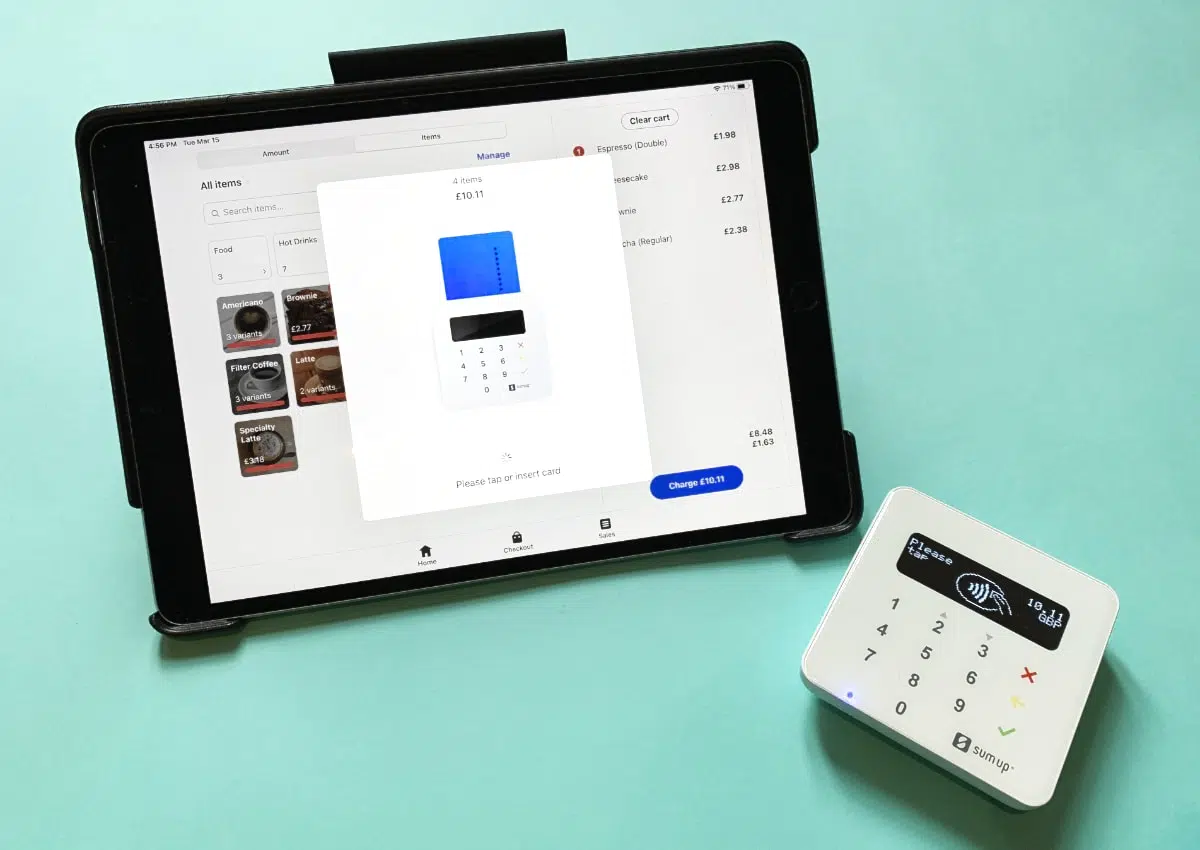
SumUp Air works with SumUp’s own POS systems as well as others.
The Dojo Go package doesn’t come with any point of sale (POS) software, just the basic payment features on the card terminal. Instead, you can integrate with an external POS system of your choice. Dojo doesn’t state which software is compatible, but they say it works with over 500 different EPOS systems.
It’s meant to be easy to set up – you ask Dojo about integrations, then receive details specific to your chosen EPOS. It is then your POS provider that can connect Dojo with their software, in some cases on-site at your location.
Online and remote payments
Today’s brick-and-mortar businesses benefit from several sales channels, so online selling tools are increasingly important.
Dojo doesn’t have much to offer on that front, only:
- Payment links sent from the Dojo account in a browser
- QR code payments for remote or tableside ordering
- Keyed entry for over-the-phone transactions where the customer is not present
The keyed entry option (commonly referred to as virtual terminal) may need to be activated by Dojo before you can use it. There’s currently no way to integrate Dojo with other online selling tools, but this could change in the future.
| Remote payment | Dojo | SumUp |
|---|---|---|
| Virtual terminal (keyed) | Yes | Yes |
| Payment links | Yes | Yes |
| QR code payments | Yes | Yes |
| Online store | No | Yes |
| Invoicing | No | Yes |
| Remote payment |
Dojo | SumUp |
|---|---|---|
| Virtual terminal (keyed) | Yes | Yes |
| Payment links | Yes | Yes |
| QR code payments | Yes | Yes |
| Online store | No | Yes |
| Invoicing | No | Yes |
SumUp has a lot more online sales tools, including:
- Payment links sent from the app or web dashboard
- QR codes for table-side ordering and touch-free till payments
- Virtual terminal in a web browser or in-app, plus keyed entry at checkout
- Email invoicing software in browser and app
- Online store builder with checkout built in
None of these have a monthly fee, only the fixed transaction fee applicable to online or keyed payments.
All the tools are easy to use and accessible in SumUp App. The breadth of invoicing features is impressive considering it’s free to use. The online store is very basic, but created quickly from the app, which can’t be said of other ecommerce solutions. Links, QR codes and the virtual terminal are simple, but do their job effectively.
Customer support and reviews
Both platforms offer 7-day support via telephone or email, but the opening hours differ slightly.
Dojo has a phone line for account queries Monday to Sunday between 8am-6pm and a technical support line between 8am-11pm every day. After 11pm, there is no support, so if you’re a pub or late-night bar, it might be an issue. They can, however, ship a terminal replacement the next working day if it’s faulty.
SumUp prefers that you message or email them, as there is no phone number advertised (they may offer a number in the chat, though). You can reach support between 8am-7pm on weekdays or 8am-5pm on weekends, i.e. there’s no help late at night if there’s a technical hiccup.
Photo: ES, MobileTransaction
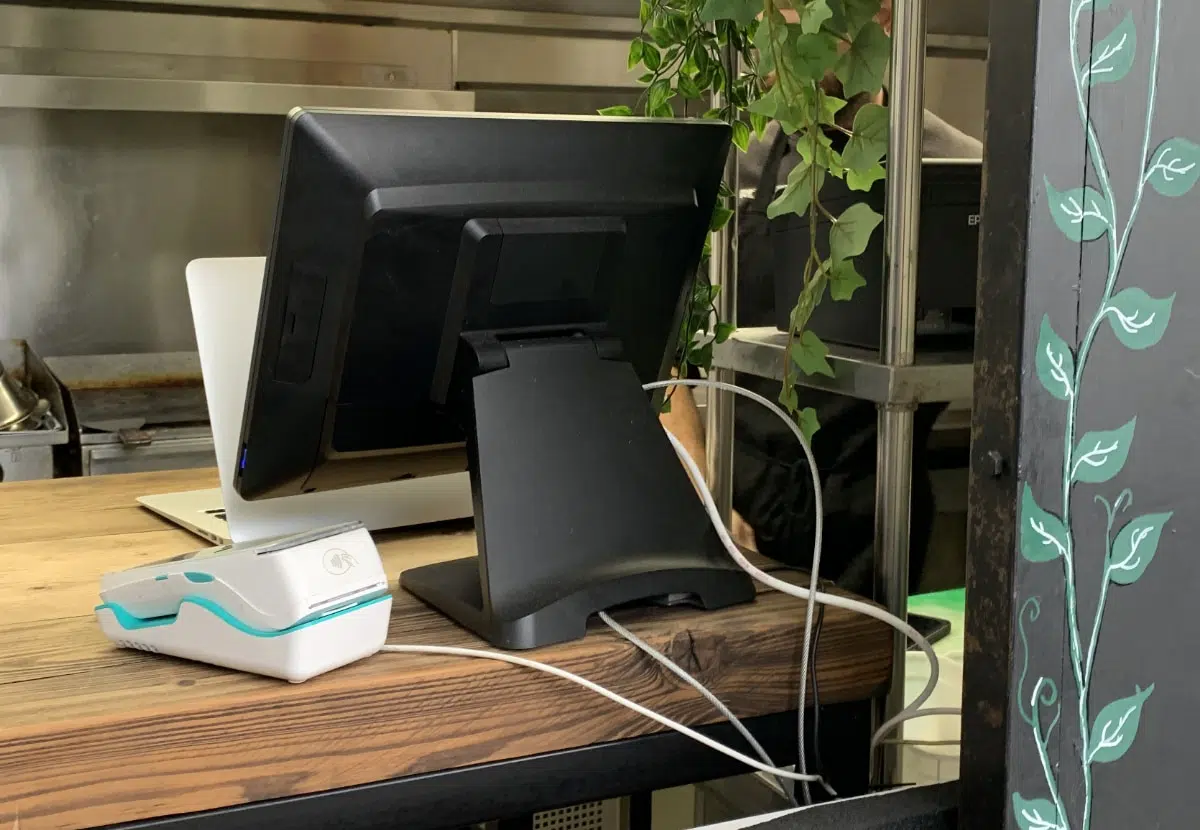
Dojo Go on a counter at Mean & Green in London.
What do users say about the different companies? Dojo is still a relatively new company, but has managed to gain a rapid foothold among small businesses in London and beyond. The average Dojo reviews rate the company highly, often highlighting a good service and how efficiently the system works.
It’s clear that Paymentsense, who’s behind Dojo, has improved its service and put a lot of resources into this simple product so it just works.
In contrast, SumUp has been around for a decade and become a common sight in cafés, market stalls and small shops. Reviews talk about it being a great product, easy to use and cheap, and its app is updated regularly to avoid bugs. That said, reviews are a mixed bag, with many talking about a poor service when issues arise.
Verdict: choice depends mostly on turnover
Without doubt, SumUp and Dojo both have excellent products with fair pricing – for the businesses they’re geared towards.
For small businesses with a card turnover of less than £5000-£10,000 monthly, the choice is clear: SumUp. The predictable card rate is reasonable and the lack of monthly fees and contract make it cheaper, especially when you can’t foresee sales over the next year. What’s more, the many free selling tools mean you don’t have to sign up for anything else.
Dojo can potentially offer more competitive rates above the £150k yearly turnover threshold. The rental subscription and monthly minimum service charge won’t matter much in that case, when card rates are low and sales consistently high. But if sales are only just below £150k/year, it’s worth considering whether SumUp’s fixed rate and lack of other fees will serve you better.
Is Dojo always better for those with a higher sales volume? Not necessarily, because SumUp can personalise rates above a £60k/year card turnover. If you start with SumUp and demonstrate a high sales volume, you can negotiate down the rate. What’s more, you only need to make over £2,800 monthly to save money with the low fixed rate on the SumUp One subscription.
Product-wise, Dojo’s card machine is the best quality terminal. It works in most situations, whether independently or coupled with your choice of EPOS, and transactions land in your bank account the very next day. There just aren’t many extra sales tools, so it’s really mainly about the card machine.
SumUp’s card readers are comparatively cheap to buy, small and efficient, but not as sophisticated as Dojo’s Android terminal. On the other hand, SumUp integrates out-of-the-box with its own POS system, business account and online payment tools, which makes running a business easier.
If you want the best service, Dojo wins with its longer support hours, fast terminal replacement and efficient onboarding. Personal support is not SumUp’s strength, but they do make an effort to update its features regularly.

